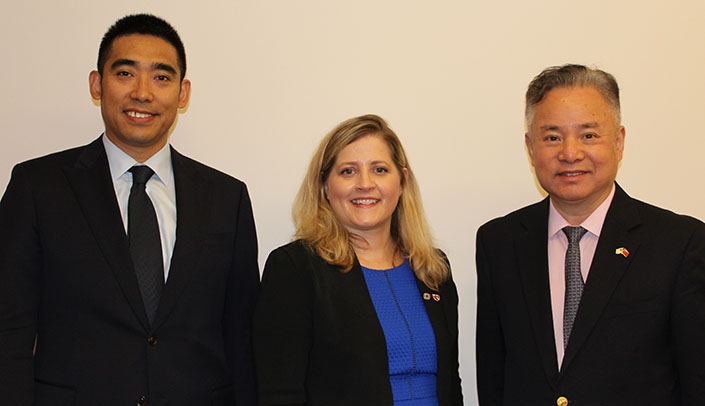On July 3, a delegation from the Embassy of the People’s Republic of China in the United States of America visited UNMC. Delegation members included Jianjun Cen, minister counselor, and Dong Niu, first secretary, both from the Office of Education Affairs.
Their purpose was to meet with UNMC leadership and China Scholarship Council (CSC) faculty, scholars and students at UNMC to learn about their studies and life in Omaha. They chose to visit UNMC because of the diversity of programs in which CSC-sponsored students and scholars participate. These programs range from six-month training programs to Ph.D. and health professions degree programs.
Cen and Niu met with CSC students and scholars at a reception and presentation session. The reception allowed for an informal discussion about life in Omaha. The presentation session gave the delegation the chance to learn more about the types of programs at UNMC and to ask questions of the students.
“This visit is a great opportunity for Chinese students at UNMC to connect with our country,” said Xiaoting Sun, a Ph.D. candidate in health services, research and administration. “During the reception and discussion session, I felt that the ambassadors were impressed by our campus culture and the effort that UNMC has put into collaborations with China. Cen and Niu also asked us about difficulties we face and how they could help.”
During their visit, they met with Jane Meza, Ph.D., associate vice chancellor for global engagement at UNMC and UNO. “Mr. Cen and Mr. Niu were impressed by the CSC programs we have here and the quality of students and scholars we have,” Dr. Meza said. “UNMC has set the standard that the embassy would like to match with other programs. It was also good to see how much the embassy cares about its students and scholars.”
“Their visit was really encouraging for us,” Xiaoting said. “Before they left, they told us that through the strong training we receive at UNMC, we will be the next generation of ambassadors when we return to China to improve medical education, clinical care, and research collaborations.”
